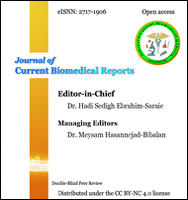Effects of Black Cumin (Nigella sativa L.) on patients with cancer and tumor: A systematic Review
Abstract
Experimental studies demonstrated a positive effect of administration of Nigella sativa L. (Back cumin) and its active chemical components on cancer and tumor through the antioxidant and anti-cancer activity. This study aimed to determine the beneficial effect of the use of black cumin in patients with cancer and tumor. This systematic review includes 4 randomized controlled trials that investigated the effect of the administration of black cumin in human cancer. Articles were searched in PubMed, Cochrane library, Semantic scholar and directory of open access journal (DOAJ), open grey and grey literature report databases for studies from 1983 to 2020 before May using the following keywords, Nigella sativa, black cumin, cancer, tumor, etc. The results examined that N. sativa is much effective in treating breast cancer, gastrointestinal cancer, brain tumor, and acute myeloid leukemia. According to the limited evidence from the study, black cumin may have favorable effects on cancer and tumor. However, more research is needed on different types of cancer to confirm and establish the above findings.
Keywords
References
Akram Khan M, Afzal M. Chemical composition of Nigella sativa Linn: Part 2 Recent advances. Inflammopharmacology. 2016; 24(2-3):67-79.
De Luca V, Salim V, Atsumi SM, Yu F. Mining the biodiversity of plants: a revolution in the making. Science. 2012; 336(6089):1658-61.
Takruri HRH, Dameh MAF. Study of the nutritional value of black cumin seeds (Nigella sativaL). J Sci Food Agric. 1998; 76(3):404-10.
Ramadan MF. Nutritional value, functional properties and nutraceutical applications of black cumin (Nigella sativa L.): an overview. Int J Food Sci Technol. 2007; 42(10):1208-18.
Mosbah R, Djerrou Z, Mantovani A. Protective effect of Nigella sativa oil against acetamiprid induced reproductive toxicity in male rats. Drug Chem Toxicol. 2018; 41(2):206-12.
Hashem MA, Mohamed WAM, Attia ESM. Assessment of protective potential of Nigella sativa oil against carbendazim- and/or mancozeb-induced hematotoxicity, hepatotoxicity, and genotoxicity. Environ Sci Pollut Res Int. 2018; 25(2):1270-82.
Yuksel S, Tasdemir S, Korkmaz S. Protective effect of thymoquinone against cyclophosphamide-induced genotoxic damage in human lymphocytes. Bratisl Lek Listy. 2017; 118(4):208-11.
Habib MA, Afroze M, Islam MF, Sajid M, Chowdhury AI, Ahmed N. Nigella sativa: A Traditional Remedy for the Prevention of Non-Communicable and Communicable Diseases. Sch Int J Tradit Complement Med. 2020; 3(7):149-56.
Mostofa AGM, Hossain MK, Basak D, Bin Sayeed MS. Thymoquinone as a Potential Adjuvant Therapy for Cancer Treatment: Evidence from Preclinical Studies. Front Pharmacol. 2017; 8:295.
Asaduzzaman Khan M, Tania M, Fu S, Fu J. Thymoquinone, as an anticancer molecule: from basic research to clinical investigation. Oncotarget. 2017; 8(31):51907-19.
Higgins J, Green S. Cochrane Handbook for Systematic Reviews of Interventions. Version 5.1.0. [updated March 2011]. The Cochrane Collaboration. Available at: https://handbook-5-1.cochrane.org/.
Behnamfar N, Parsa Yekta Z, Mojab F, Kazem Naeini SM. The effect of nigella sativa oil on the prevention of phlebitis induced by chemotherapy: a clinical trial. Biomedicine (Taipei). 2019; 9(3):20.
Hussain SA, Mohammed Ameen HA, Mohammed MO, Ahmed KM, Hama-Gareb Ali R, Safar BM, et al. Nigella sativa Oil Mouth Rinse Improves Chemotherapy-Induced Oral Mucositis in Patients with Acute Myeloid Leukemia. Biomed Res Int. 2019; 2019:3619357.
Mousa HFM, Abd-El-Fatah NK, Darwish OA, Shehata SF, Fadel SH. Effect of Nigella sativa seed administration on prevention of febrile neutropenia during chemotherapy among children with brain tumors. Childs Nerv Syst. 2017; 33(5):793-800.
Rafati M, Ghasemi A, Saeedi M, Habibi E, Salehifar E, Mosazadeh M, et al. Nigella sativa L. for prevention of acute radiation dermatitis in breast cancer: A randomized, double-blind, placebo-controlled, clinical trial. Complement Ther Med. 2019; 47:102205.
Arafa el SA, Zhu Q, Shah ZI, Wani G, Barakat BM, Racoma I, et al. Thymoquinone up-regulates PTEN expression and induces apoptosis in doxorubicin-resistant human breast cancer cells. Mutat Res. 2011; 706(1-2):28-35.
Şakalar Ç, İzgi K, İskender B, Sezen S, Aksu H, Çakır M, et al. The combination of thymoquinone and paclitaxel shows anti-tumor activity through the interplay with apoptosis network in triple-negative breast cancer. Tumour Biol. 2016; 37(4):4467-77.
Effenberger K, Breyer S, Schobert R. Terpene conjugates of the Nigella sativa seed-oil constituent thymoquinone with enhanced efficacy in cancer cells. Chem Biodivers. 2010; 7(1):129-39.
Zhang M, Du H, Huang Z, Zhang P, Yue Y, Wang W, et al. Thymoquinone induces apoptosis in bladder cancer cell via endoplasmic reticulum stress-dependent mitochondrial pathway. Chem Biol Interact. 2018; 292:65-75.
Zhang Y, Fan Y, Huang S, Wang G, Han R, Lei F, et al. Thymoquinone inhibits the metastasis of renal cell cancer cells by inducing autophagy via AMPK/mTOR signaling pathway. Cancer Sci. 2018; 109(12):3865-73.
Kou B, Kou Q, Ma B, Zhang J, Sun B, Yang Y, et al. Thymoquinone inhibits metastatic phenotype and epithelial‑mesenchymal transition in renal cell carcinoma by regulating the LKB1/AMPK signaling pathway. Oncol Rep. 2018; 40(3):1443-50.
Kou B, Liu W, Zhao W, Duan P, Yang Y, Yi Q, et al. Thymoquinone inhibits epithelial-mesenchymal transition in prostate cancer cells by negatively regulating the TGF-β/Smad2/3 signaling pathway. Oncol Rep. 2017; 38(6):3592-8.
DOI: https://doi.org/10.52547/JCBioR.2.1.38
Refbacks
- There are currently no refbacks.
Copyright (c) 2020 © The Author(s)

This work is licensed under a Creative Commons Attribution-NonCommercial 4.0 International License.













